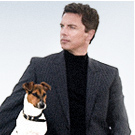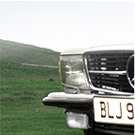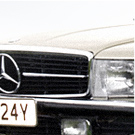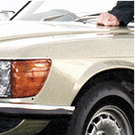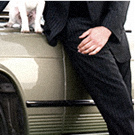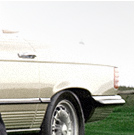Both Sides of the Pond: John Barrowman talks about his multi-faceted career
Interview by Lynda Trapnell
Originally published in Issue #18 of Musical Stages, Summer 1999
Article republished by kind permission of Lynda Trapnell.

Just before John started rehearsals to take over as The Beast, he came round to talk about his career to date. It was a rotten, rainy morning: he had a cold; but he arrived with a pot of chrysanthemums and a big smile. He looks very much the all-American college graduate - tall, broad-shouldered, confident - and his blue yes, dark hair and ready laugh make him an attractive figure to have lounging on your sofa.
He's had a bit of a charmed career and his good looks must have helped. However, he is also friendly and outgoing with a huge enthusiasm for his work. He retains an almost ingenuous delight and surprise at the way things have gone for him, but admits that he has worked hard to achieve his current level of success.
Born in Glasgow, his father's company moved the family to America permanently when he was just eight. They started off in Illinois where John first realized that was wanted to be an actor. He was involved in school productions and in amateur dramatics and studied with voice teachers. He went to university in Southern California so he is, he says, a mix of Scottish roots, Mid-West and California, giving him a well-rounded grasp on cultures and people. He is in the useful position of being able to work in either country, having a Certificate of Right to Abode in his passport.
"It just means I don't have to wait in those long lines when I go through immigration and customs!" he grins, reaching for his mug of coffee. "But it's even better now. I was stopped recently by a customs guy who said, 'You go through here sometimes twice a week - come with me!' I thought, 'Oh-oh, they've got me for something', but what they do is take a record of your palm print so when I go into America, I just go to this machine that scans your hand and you can go right in. Isn't that great?"
While John was in high school he worked for two summers at a musical theme park, called Opryland. They had thirteen shows running. The first one he was involved in, I Hear America Singing A Song, was a review of works by great American composers. The following year, it was Way Out West, based on all the Western American musicals, like Oklahoma! and the story was based on the TV series Gunsmoke.
"I played Marshall Dillon and we had a Miss Kitty - all the characters. I think that must be where I learned to interact and be accessible to audiences. After the show, we had to sit down on the edge of the stage and talk to every single person. It was a thousand-seater auditorium and they all passed us by and every one of them would shake our hands, ask to take pictures, thank us for the show - it was the best training I could have. I've been on stage where things have gone wrong, and I'm able to cope, which can be useful." Around this time, John went to see the musical Dreamgirls and realized that he had to make acting his career and that he needed more training. His determination is illustrated in what comes next.
"I went to do my last year at Opryland and I was also offered a job at Disneyland in Florida but it wasn't really the right show for me. I was thinking, 'Oh gosh, I'm eighteen years old and I'm turning down all these benefits.' Apart from a good salary, you get stock options, you get accommodation and you get medical cover and I was saying 'No!' The guy said 'Well what are you going to do?' and I said 'I'm gonna work for Opryland. It's less money, but it's a show I want to do.' The man said 'You know something Mr. - er - Barrowman. Most of the people who turn us down, end up doing something really good and I'm sure I'll see your name in the future somewhere.' When I did Anything Goes, he wrote to me to say, 'I told you so. The people who know what they want are always the ones we lose.' So it's kind of ironic that I'm now working for Disney doing something I do want to do!"
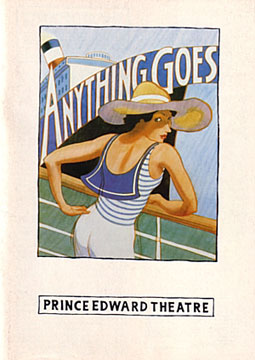
In 1989 John had arrived in England to study and was in Scotland on holiday when he heard about the audition for Anything Goes. They were looking for a young man who could do an American accent and could sing and dance. John didn't think he had a chance, knowing that although people play leads in school and in amateur dramatics, for their first professional theatre, they often end up in the chorus.
"I felt that I could gain something, but wouldn't lose anything by auditioning. I didn't have any music with me, but the funny thing was, I had just played Billy Crocker in an amateur production, so I knew the dialogue and I knew the songs. I went to a restaurant across the street and did my warm up in their bathroom - some guy knocked on the door and said 'I don't know what you're on Jimmy, but I'll have some of it!' so I had to come out."
"I went in to audition and sang one song. I can always tell at auditions if people are interested. I saw Larry Oakes (sadly not with us anymore) sit up straight and look at Suzanne Smith and she looked at him and I thought 'Maybe'. I sang another song and they asked me to take the script. I know this sounds bizarre, but when I'm in Scotland (or around my parents) I speak with a Scottish accent. They said 'Do an American accent for us'. So I said, 'I'll try! So I went off to read the script, came back in and did what I had to do and they said 'Thank you very much, we'll be in touch.'"
John was told later that when he left the room, they all said, "We've found him! Even if he is too young, we can't lose him!" They flew him to London to meet Elaine Paige, whose first comment was, apparently, "He's pretty, let's see if he can sing!"
After he'd proved he could, it was time to try out the dancing. Elaine told John that her legs were a bit tired, so he heard himself saying "Don't worry, honey, I'll keep you up, I'll keep you in time!" Elaine looked at him but just grinned. Later, she told she thought he must have something. Further, as he was so young, she suggested to her co-producers that rather then playing her boyfriend, John could play her best friend. But in fact, the audience seemed to like her being the older woman with a younger man.
"That was my first role and I had to leave my parents in Scotland and start rehearsals. It was a great time and during it, Larry Oakes taught me all I needed to know about working in the professional theatre; the right and wrong things to do."
Larry knew Cameron Mackintosh and that Cameron was seeing people for Just So at the Tricyle Theatre. So John went to audition. Cameron stopped him, saying "You're not right for this, but you'd be perfect for Miss Saigon." Simon Bowman was having some throat problems and they need a cover.
Having just played a leading role, John was not too keen on covering, but Cameron said it would be worth his while, so he agreed to do it as an 'alternate'.
After six months, the short-lived Matador came along but Cameron has kept John under his wing. "You can get into a rut going from show to show but Cameron has always chosen things wisely and I've been able to say 'No' to something and he hasn't given up on me. Putting me in Miss Saigon taught me a completely new kind of musical." Meanwhile, Cameron arranged for John to meet Hal Prince to be seen as a possible take over as Raoul in The Phantom of the Opera and he played the role for a year.
We then lost John to America for a while when he went off to work for Michael Jackson's company on a proposed production of Red, Red, Rose - about the life of Robert Burns - which came third in the Danish Musical of the Year. For that, he returned to his native Scots accent. After doing a lot of backers' auditions for six months, he came back and returned to Miss Saigon, this time doing six performances with another actor as his alternate. But he wanted to try something new. He heard that Philip Schofield was leaving television's Going Live and the producers were looking for a new presenter.
"I made a little video about what was hot and what was not for young people in London and my agent Janet Glass, and I sent it into the BBC. Two days later I was being screen-tested with Emma Forbes and Andy Peters and got the job. At that time I was also filming The Movie Game on Sundays and that continued until I went into Sunset Boulevard.

"Sunset Boulevard was like the crest of a wave that took me to another level. I loved working with Betty Buckley. We talked about the relationship with Trevor (Nunn) and decided that we would play it for the romance. Because if you play it for the passion, the hatred and the feeling of entrapment also comes out. The audience sees this young man being trapped by the older woman because he feels sorry for her and is hopelessly in love with her. It worked because it brings the audience closer. Michael Bauer and I played our relationship differently too - more on the teacher/student level where I learn from him and see how he handles Norma, so when he was angry with me, his fury was more real. I watched the movie once and then each day of rehearsals, I made myself believe that Betty was Norma and every performance I fell in love as she sang 'With One Look'. I began by being this arrogant young man and by the end of the song I was hooked."
After one particular performance, Trevor Nunn came round to praise John's 'great idea', using chewing gum to convey his flippancy toward Norma. John admitted it was accidental.
"I said, 'Trevor, I just forgot to spit it out!' and he said 'Don't tell anybody. Keep it in!' For him it made the entire difference - it made me look arrogant - it was my 'cigarette'. I used to sit watching Betty Buckley in amazement. It's partly because I grew up seeing her on television and I remember seeing her in Edwin Drood, the first Broadway show I ever saw and I was in awe of her. So I'd just concentrate on how she was singing and give myself over to the atmosphere. I would think of us as being behind a screen with the audience spying our little world."
When Elaine Paige took over, it was different again and, John says, great for him because Elaine played the humour more. It put him back on his toes and he had to figure out new ways to reach his objective with this Norma. If she wanted to be funny, then he would be funny and that also worked for the piece.
It was Sunset Boulevard that was mainly responsible for getting John the American TV series, Central Park West. The casting people came over to London and one of them had a niece with a poster of John on her bedroom wall. As in all the best Hollywood stories, they flew him to America for a screen test. After a year, the show was cancelled, but it ran in 90 countries around the world.
Next, John reprised his role as Joe Gillis on Broadway with Betty Buckley, followed by a concert version of Evita in Oslo, then Aspects of Love in Dublin and Cork. "That was a great show to do. I came back to do The Fix for Cameron. I fell in love with that as soon as I heard it and I loved playing a guy who was an addict and had a mistress! I was so disappointed when it didn't take off."
Meanwhile, Cameron suggested to Stephen Sondheim that John should join Susan Egan, Carol Burnett and John McCook in the cast of Putting It Together in Los Angeles.

"While rehearsing, I took the opportunity to go up to San Francisco and present The Fix up there to ACT's theatre. But I think because of the presidential scandals it just couldn't happen. However, I had a great time in LA and with any luck, Putting It Together will have a further life. I can't wait to do it again."
So now we're up to date. John was originally considered to take over The Beast on Broadway, but they felt he was too young. "I'm a firm believer that unless a role calls specifically for a fifty year old, actors should be given a chance to play around their true ages. Trevor and Andrew both took a chance with me for Sunset. Cameron did for Miss Saigon. I've auditioned for Beauty and The Beast about four times and I was always 'too young'. Finally they saw me playing a more mature man in Putting It Together. I looked as if I were in my mid-thirties, which I am not, let me make clear! So I have the Beast's fantastic song to sing and I wanted to do it so I'm glad they finally came to me."
So are the audiences. I went to John's first night and afterwards, had the pleasure of meeting his parents. And yes, he does speak with a Scottish accent when he's around the Scots. It's very endearing.



